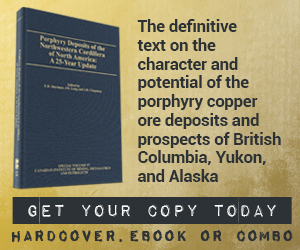Library Magazine Articles Qualified persons
Qualified persons
Deborah McCombe - Aug 2007
The involvement of a Qualified Person (QP) in the preparation of scientific and technical information on a mineral property is a cornerstone of National Instrument 43-101, Standards of Disclosure for Mineral Projects (NI43-101).
The QP is an individual who is an engineer or geoscientist with at least five years of experience in mineral exploration, mine development or operation or mineral project assessment, or any combination of these, has experience relevant to the subject matter of the mineral project, and is in good standing with a professional association. A professional association is a self-regulatory organization of engineers, geoscientists, or both engineers and geoscientists. In Canada, geoscientists or engineers who are members of a provincial or territorial association of engineers would satisfy the third requirement of being a Qualified Person. Most foreign associations are not generally given authority or recognition by statute, so a list of the foreign associations recognized by the Canadian Securities Administrators (CSA) is attached as Appendix A of NI43-101.
This list will change with time as other foreign associations are recognized by the CSA and when NI43- 101 is modified. If a company wishes to rely on the advice of a foreign geoscientist or engineer who is not a member of one of these organizations, the individual could join one of the Canadian associations that accepts foreign members or the company could apply for exemptive relief. If the relief is granted however, the exemption will likely be limited to a particular property or task and will be for a limited time period.
QP’s Responsibilities
It is the QP’s responsibility to comply with professional and industry standards, including best practices. If you as a QP are going to rely on other experts, you must satisfy yourself that it is reasonable to rely on these experts. The QP who is taking primary responsibility for the technical report must conduct a site visit. If several QPs are preparing and taking responsibility for the technical report, then the appropriate QP should visit the site. For example, if an operating mine has metallurgical issues, at a minimum, a metallurgical engineer should visit the site. Data verification is a key element of NI43-101. The QP must state whether data verification was conducted or not. If you didn’t verify the data, you must explain the reasons why.
Certificates and Consents
If the QP prepares all, or a portion, of a technical report, the QP must provide the certificate and consent required by Part 8 of NI43-101. Section 8.1(2) lists the information that is required by the instrument. If you omit some of the required information such as a brief summary of your relevant experience, the items of the technical report for which you are responsible, or whether you are independent of the company, the technical report is not compliant with NI43-101.
When filing a technical report, the company must file a statement of each QP responsible for preparing or supervising the preparation of each portion of the technical report (a) consenting to the public filing of the technical report and to extracts from, or a summary of, the technical report in the written disclosure being filed and (b) confirming that the QP has read the written disclosure being filed and that it fairly and accurately represents the information in the technical report that supports the disclosure. When the QP’s technical report is used to support a disclosure document, such as an Annual Information Form or a News Release, the QP must review that document to ensure it is accurate and not misleading. Qualified Persons confirm this by providing their consent. Remember that the QP is not responsible if the company misquotes the QP, unless the QP reviewed the disclosure and gave consent. Qualified Persons should not release their consent in advance of their review of the company’s proposed disclosure.
Appendix A- Recognized Foreign Associations and Designations Foreign Association Designation
American Institute of Professional Geologists (AIPG) Certified Professional Geologist Any state in the United States of America Licensed or certified as a professional engineer Mining and Metallurgical Society of America (MMSA) Qualified Professional
European Federation of Geologists (EFG) European Geologist
Australasian Institute of Mining and Metallurgy (AusIMM) Fellow or member Institute of Materials, Minerals and Mining (IMMM) Fellow or professional member Australian Institute of Geoscientists (AIG) Fellow or member
South African Institute of Mining and Metallurgy (SAIMM) Fellow
South African Council for Natural Scientific Professions (SACNASP) Professional Natural Scientist Institute of Geologists of Ireland (IGI) Professional Member
Geological Society of London (GSL) Chartered Geologist
National Association of State Boards of Geology (ASBOG) Licensed or certified in: Alabama, Arizona, Arkansas, California, Delaware, Florida, Georgia, Idaho, Illinois, Indiana, Kansas, Kentucky, Maine, Minnesota, Mississippi, Missouri, Nebraska, New Hampshire, North Carolina, Oregon, Pennsylvania, Puerto Rico, South Carolina, Texas, Utah, Virginia, Washington, Wisconsin or Wyoming
About the Author
Deborah McCombe is executive vice president and consulting geologist at Scott Wilson Roscoe Postle Associates Inc.

.png)
